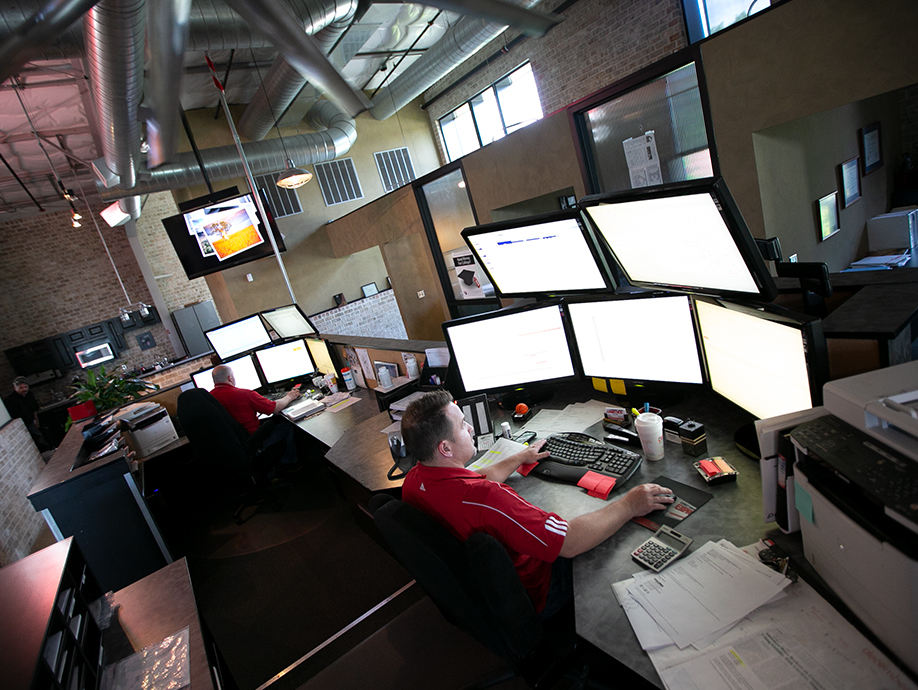Shipping Options
What would you like a quote for?

Domestic Air
Domestic Air shipping refers to the shipment of packages via aircraft within the continental United States. In most cases, shipping via domestic air is chosen because it offers faster delivery time than shipping by ground. In instances of time-sensitive deliveries to remote areas, it is often more cost-effective to ship by air than by ground, as small aircraft can get to these areas and land at their small airports much faster than it would take for a truck to get there.
Learn More Request A Quote
Dry Van
Dry Van shipping refers to the transport of freight in a standard trailer without temperature control. Freight can be secured on pallets, packed in boxes or secured in some other manner. If your freight does not have any special temperature requirements and will fit into a truck trailer, dry van shipping is likely going to by your most cost-effective shipping solution.
Learn More Request A Quote
Truck Load
The term “truck load” refers to the freight carried by a tractor trailer. The amount of freight carried can be either a full truck load (FTL) or “less than truck load” (LTL). As logistics specialists, Direct Drive Logistics coordinates the availability of drivers and trucks of various sizes with the requests of shippers looking to move freight across the country.
Learn More Request A Quote
Flat Bed
A flat bed truck (also known as “flatbed”) is one with a flat, open bed and a standard length of 48 feet. These trucks are commonly used for transporting automobiles, tractors and industrial machinery which cannot easily fit into a contained trailer. The ability to load these trailers from the sides, rear or top makes them extremely versatile. In the case of high tonnage industrial machinery, trucks with expandable flatbeds and as many as 6 to 9 axles are sometimes necessary.
Learn More Request A Quote
Flat Bed LTL
The term “Flatbed LTL” refers to smaller flatbed loads which do not occupy all the space on a trailer. “LTL” is shorthand for “Less than Truck Load”—basically, a partial truckload. When possible, shippers will combine shipments from different clients on the same flat bed. With a standard length of 48 feet and the versatility of side loading, top loading or back loading, flat bed trucks are usually capable of hauling freight from more than one shipper.
Learn More Request A Quote
Food Service
Food service shipments are most often done via truck, but can also be handled by rail or aircraft—sometimes a combination of all three. In most cases, these shipments require temperature controlled containers in order to ensure the food does not spoil in transit. In addition to infallible logistics to ensure timely delivery, the shipping of perishables requires compliance with all FDA shipping regulations.
Learn More Request A Quote
Intermodal
Intermodal freight shipments involve the transportation of freight in a container via different modes of transport, such as truck, rail and ship. The freight remains in the intermodal container, thereby simplifying the process of transferring it from one mode of transit to another. Because rail transport is more economical than truck transport, intermodal shipping which utilizes rail transport as much as possible can significantly reduce your transportation costs.
Learn More Request A Quote
Intermodal Air
Intermodal Air shipping involves the shipping of freight in a container which can be readily moved from one aircraft to another, or from an aircraft to a truck for the next leg of the shipment. Due to the smaller cargo holds of aircraft, the containers used for intermodal air shipping are considerably smaller than those used for intermodal rail transport. As with all shipments by air, Intermodal Air transport is usually requested when time is of the essence.
Learn More Request A Quote
LTL
LTL refers to Less than Truck Load shipping. Typically, this involves the shipping of freight weighing between 150 and 20,000 lbs. The biggest advantage of shipping via LTL is that it costs a fraction of what it costs to have a Full Truck Load shipper (FTL) handle your shipment. You may also have the option of liftgate service, inside delivery, a notification your shipment is about to be delivered and other services not generally available with Full Truck Load shipping.
Learn More Request A Quote
Ocean
Transporting freight by ocean-going ships is a common mode of transport, particularly for international manufacturers of heavy equipment and businesses shipping large quantities of goods. Freight is loaded into steel containers ranging from 20’ to 40’ length by approximately 8’ wide and 8’ high. Less than Container Loads are an option for shippers without enough freight to fill an entire container. The containers are usually stored at port until they can be shipped via rail to a distribution center for unpacking.
Request A Quote
Over Dimensional
Over dimensional shipping loads are those which are large, heavy or oddly sized. Such shipments sent by ocean or rail require extra blocking and bracing to ensure they do not break free while in transit. Over dimensional shipments traveling by semi trailer also require extra attention to securing them for transit. Trucks with extra axles and load capacities are necessary, as well as heavy lift forklifts to load and unload the over dimensional items.
Learn More Request A Quote
Heavy Haul
Heavy Haul transport involves the moving of large, heavy equipment and machinery via tractor trailer. These over-weight loads, typically in excess of 200,000 lbs., are often over-dimensional as well and require an accompanying vehicle to alert other motorists on the road. Such loads require expert logistics support due to the permits required by many states and the need to plan a route which will accommodate larger and heavier than normal trailers.
Learn More Request A Quote
Produce Retailing
The shipping of produce such as fruits and vegetables demands precisely coordinated logistics in order to get these perishables to their destination as expediently as possible. Properly insulated and refrigerated containers/vehicles are essential for keeping these goods within an ideal temperature range. For full details on the shipping of produce and other perishables, the Perishable Cargo Regulations (PCR) manual is considered the worldwide reference to consult.
Learn More Request A Quote
Rail Car
A rail car, sometimes generically referred to as a Box Car, is a commonly used method for transporting goods across country. While the traditional enclosed Box Car may be what comes to mind first, rail cars can also take the form of Intermodal Well Cars designed to haul intermodal boxes or Center Beam Cars built to haul lumber and other similar products. For long haul shipments, rail transport offers significant cost savings over shipping via truck. Since trains only emit about 5.4 pounds of carbon dioxide per 100 ton-miles versus the 19.8 pounds trucks emit, rail transport is also more environmentally friendly.
Learn More Request A Quote
Reverse Logistics
In a normal shipping scenario, products are sent from the manufacturer or distributor to the customer. Reverse logistics concerns the exact opposite of this—shipping from the customer to the manufacturer or distributor. Reverse logistics can involve the return shipping of industrial equipment and machinery which has been rented, the return of equipment/product which has been found to be defective, even the return shipping of materials or products for the purpose of recycling or refurbishing.
Learn More Request A Quote
Special Handling
The term “special handling” refers to extra services requested by a shipper, for which an extra charge is added to the cost of shipping. These extra services can range from lift-gate service to notification prior to delivery, weekend or holiday delivery, and even short-term storage at a terminal. “Special handling” is also used to describe shipping services requiring extra attention or precaution, such as the transport of hazardous materials or of live animals.
Request A Quote
Temperature Controlled LTL
Less than truck load (LTL) shipments of perishables, plants or even animals usually require temperatures within a specific range. Such shipments are prime candidates for Temperature Controlled LTL. In addition to complying with FDA regulations, the logistics of moving goods in a timely manner in especially critical when the goods are perishables.
Learn More Request A Quote
Temperature Controlled Truckload
The shipment of perishables such as fruits, vegetables and meats requires strict temperature control to avoid product spoilage. Large growers and distributors with enough product to fill an entire truck are the typical customer of Temperature Controlled Truckload shipping. Logistics play a key role in such shipments, too, since time is of the essence in getting these goods from the field to market.
Learn More Request A Quote



